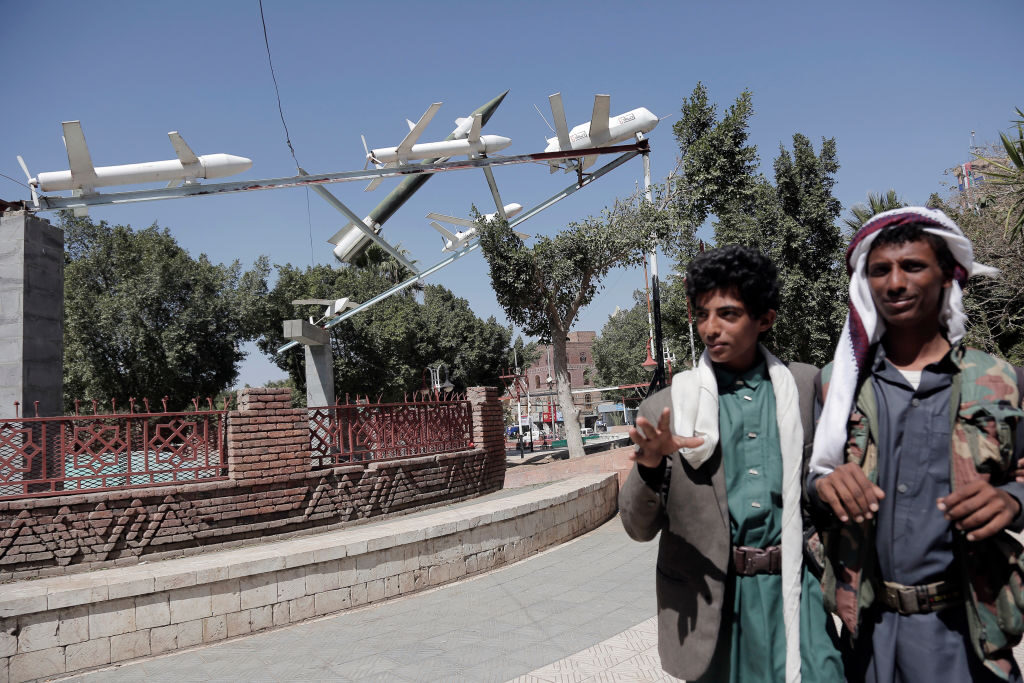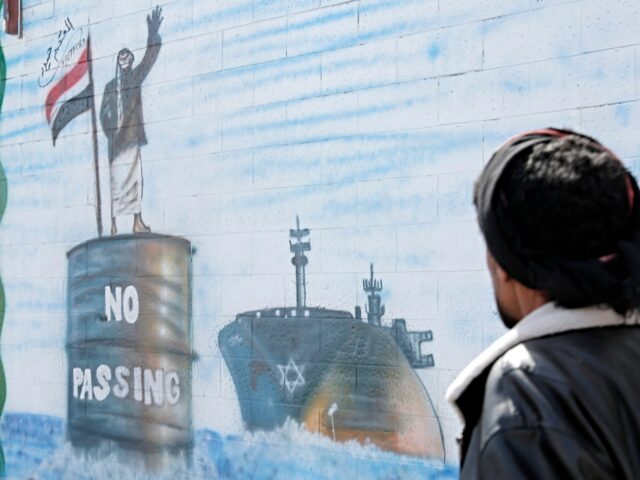The U.S. and UK on Saturday launched a fourth round of “self-defense” airstrikes against 18 targets in Yemen controlled by the Iran-backed Houthi terrorists, destroying missile storage facilities, drones, radars, and one helicopter.
The Houthis still managed to attack a U.S.-flagged tanker in the Red Sea and launch several suicide drones on Monday but the missile shot missed and U.S. forces were able to intercept the drones.
The United States, United Kingdom, and their coalition partners released a joint statement on Monday describing the weekend airstrikes as a “necessary and proportionate” measure to “disrupt and degrade the capabilities that the Houthis use to threaten global trade, naval vessels, and the lives of innocent mariners in one of the world’s most critical waterways.”
The strikes targeted 18 targets in eight locations, including “underground weapons storage facilities, missile storage facilities, one-way attack unmanned aerial systems, air defense systems, radars, and a helicopter.”
U.S., UK Resume Air Strikes Against Yemen’s Huthishttps://t.co/fJnTRAk7wG
— Breitbart London (@BreitbartLondon) February 25, 2024
The coalition mentioned several specific Houthi attacks it was responding to, including a missile attack that injured a crew member aboard the British-owned MV Islander on February 22, a near-miss missile strike on February 19 against the U.S.-owned MV Sea Champion while it was carrying humanitarian aid to Yemen, a kamikaze drone attack the same day against the U.S.-owned MV Navis Fortuna, and the February 18 missile attack that severely damaged the UK-owned MV Rubymar.
The Rubymar was damaged badly enough to force the crew to abandon ship. U.S. Central Command (CENTCOM) said on Friday the ship remains “anchored but slowly taking on water,” while the Houthis have repeatedly claimed they were able to sink it.
CENTCOM said the irresponsible strike on the Rubymar is causing an environmental calamity, due to its leaking fuel and imperiled cargo:
The unprovoked and reckless attack by Iran-backed Houthi terrorists caused significant damage to the ship, which caused an 18-mile oil slick.
The M/V Rubymar was transporting over 41,000 tons of fertilizer when it was attacked, which could spill into the Red Sea and worsen this environmental disaster.
The Houthis continue to demonstrate disregard for the regional impact of their indiscriminate attacks, threatening the fishing industry, coastal communities, and imports of food supplies.
These incidents bring the total number of Houthi attacks against commercial shipping and naval vessels to over 45 since mid-November. The statement said this wave of nautical terrorism represents a “threat to the global economy, as well as regional security and stability.”
The coalition asked more countries to step forward and field a unified “international response” to the terror attacks, which might have been a veiled jab at China for refusing to do so.

Yemenis walk under mock drones and missiles displayed at a square in solidarity with Palestinians and against the USA-led aerial attacks on Yemen, on February 25, 2024, in Sana’a, Yemen. Fresh aerial attacks carried out by jet crafts of the US and UK in the fourth round of aerial attacks targeting 18 targets run by Yemen’s Houthi movement in the capital Sana’a and other various provinces, in response to what they considered to halt the continuous Houthi attacks on vessels sailing through the Red Sea and Bab Al-Mandab Strait. (Photo by Mohammed Hamoud/Getty Images)
“We will once again reiterate our warning to Houthi leadership: we will not hesitate to continue to defend lives and the free flow of commerce in the face of continued threats,” the coalition concluded.
“We will continue to make clear to the Houthis that they will bear the consequences if they do not stop their illegal attacks, which harm Middle Eastern economies, cause environmental damage, and disrupt the delivery of humanitarian aid to Yemen and other countries,” Secretary of Defense Lloyd Austin said in a statement of his own on Sunday.
The Houthis disregarded this warning and struck again on Monday, firing an anti-ship ballistic missile at the tanker MV Torm Thor, which is both flagged and operated by Americans as part of the Tanker Security Program, a U.S. government initiative to guarantee fuel supplies for the armed forces during times of crisis.
Inflation Warning: Shipping Insurance Rates Soar as Red Sea Crisis Bites https://t.co/LpNew7ydG8
— Breitbart London (@BreitbartLondon) February 23, 2024
The Torm Thor is owned by a Danish company called Torm, but the company does not operate the ship and it has halted all Red Sea passage for the 85 ships it does operate.. Maritime security sources told Reuters the Torm Thor was sailing with a U.S. military escort when it was attacked.
According to CENTCOM, the Houthi missile landed in the water and caused no damage to the Torm Thor. U.S. warships were also able to shoot down two unmanned aerial vehicles (UAVs) in “self-defense,” implying the warships were targeted by the drones.

COMMENTS
Please let us know if you're having issues with commenting.